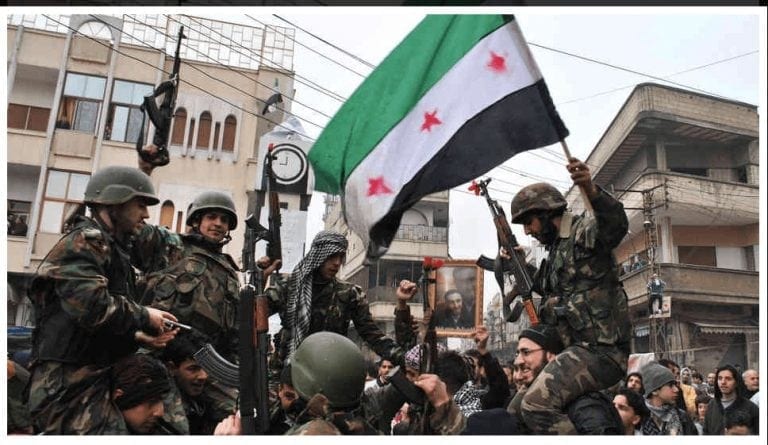![]()
By Joaquin Flores
A FORT RUSS DISPATCH
A six part report investigating the real causes of the war on Syria

Part I: Overcoming obstacles in writing and reporting on the Syrian Conflict – Introduction
The debate surrounding the origins of the war in Syria is of critical importance. The outcome of this conflict will be a major factor in determining the balance of power in the world during the coming period. With the recent and interestingly sudden refugee surge from the region into Europe, followed later by an increase in participation of Russian military forces in the conflict, being able to make sound and unbiased assessments of the causative factors in this conflict is a pressing need.
In looking at the question, we first would like to discuss the reasons for the writing of this report. The political sciences contain the taxonomic and conceptual framework, and explanatory power, to describe the causes of the Syrian conflict. But in the West, lay journalistic and semi-analytic write-ups, and otherwise accessible writing on the subject, does not make adequate use of much of these well developed ideas. These relate perhaps to practical problems relating to publishing space, as well as to how writers and publishers have assessed the capacity of mass audiences to make use of, or absorb, said writing.
In cases where western analytic works are in question, documents coming from mainstream think-tanks which deliver analysis both to governmental institutions and to the public, may indeed be engaged in willful misrepresentation of the operating schema. The approach of the author in related works has been to target the ‘real audience’: already well informed citizen-activists and ‘geopolitical trainspotters’ who have read possibly hundreds of articles on the subject, only to be confronted with recurring characterizations, recirculated memes and tropes, which problematically combine the recitation of facts alongside politically convenient narratives.
Our main task therefore is to bridge the gap between objective and systematic analysis and accessible presentation: making use of standardized tools without prejudice, delivered without reliance on references not already generally accessible to the audience. This necessarily involves some discussion of the histories of all of the players. While the total work will require 6 parts, each being slightly longer than a standard article’s length, it will condense and present information with a discussion in such a way that in fact contextualizes much of the public writing on the subject, and indeed perhaps will liberate the reader from the onerous task of data-mining in – what would otherwise be – hundreds of other articles.
Indeed, as mentioned above, the present public and accessible literature on the subject of the Syrian conflict is problematic.
Incoherencies in other attempts to describe the Syrian conflict arise from factors external to the present body of literature on the subject: there are few if any really concealed facts or truths which could make understanding the conflict difficult. Real issues arise in narratives, over-focus on some facts to the exclusion of others, and real-politik concerns relating to political polarization. This report will not review this existing literature and public writing, but instead will take a ‘clean slate’ approach, and rely on either uncontested facts, generally accepted facts, or otherwise easy to reference findings and assertions.
[dropcap]I[/dropcap]ndeed the Syrian crisis since its inception has generated a significant volume of western public literature, as attempts have been made to address the fundamental question of the war’s causes, and what the primary issues were that catalyzed and fueled its genesis. While some of these efforts were well-intentioned and partially thorough, and yet other efforts intentionally disingenuous, they were similar in their attempts to provide an answer to one of the greatest apparent geopolitical debates of the present time.
These problems have hitherto been represented in the public presentations of think-tanks, both governmental (and related, such as the Council of Foreign Relation’s ‘Foreign Policy’) and independent, alike. The debate over the war and its origins has once again polarized non-interventionist and anti-imperialist socio-political movements in the West as well, and has made strange political bedfellows of advocates, activists, analysts, and even the players themselves, on ‘either side’ of this conflict.
The Syrian conflict has drawn particular attention to questions revolving around national sovereignty and the right of peoples to self-determination; to the role of NGOs and non-profits sanctioned by the UN; to the relationship and shared rights between minority and majority demographic groups, whether religious or ethnic, within a modern nation-state; and as well as issues revolving around the inherent and internationally recognized rights of nations to preserve their security and represent their people(s) within the framework of international law and the UN charter.
Furthermore the conflict has shed light on issues relating to foreign states’ use of proxy or mercenary armies; the role of weaponized and proxy volunteer or ideologically/religiously based social-movements deployed for use in another country.
Finally the conflict has drawn attention to the roles and relationships of governments in their efforts to balance between ‘legitimacy’ on the one hand, and the external pressures placed on them to increasingly ‘liberalize’ (i.e. privatize and open to foreign control and ownership) their economies as well as the liberalization of pluralist civil institutions.
Complexity and Polarization: why public writing on the Syrian conflict is deficient
[dropcap]T[/dropcap]he theories provided to date which attempt to summarize the issue in any case have different problems, but in the case of honestly and well presented literature, the authors are not at fault per se. Rather, the deficiencies of these writings are a product of two problematic factors at work: the multitude of factors at play combined with the polarizing nature of the conflict.
Measures undertaken to simply “point a finger” and suggest that, that there is one specific reason this crisis came to be is an erroneous conclusion, and counterproductive to a more complete and accurate understanding of the question: what caused the Syrian crisis?
What caused the Syrian crisis?
[dropcap]T[/dropcap]he answer to this question is far from simple and requires in-depth analysis of all associated materials and variables rather than attempting to identify one specific causative agent (i.e. person, state, process, phenomenon, or ideology). Politics and sociology are anything but simple, and foreign policy and geostrategy is of even equal complexity.
Complex answers are unpopular, and are not ready-made for mass circulation. Understanding of the problems involves something of a learning curve, and certain processes and the underlying theories which describe them are currency among experts, but are somewhat unknown to lay readers, even those with considerable fact-based information on the subject.
Polarization
[dropcap]P[/dropcap]olarization of the subject, as stated, is another reason for problematic analysis. Out of concern that certain conclusions related to the cause of the war will be taken out of context by later critics or readers, ultimately opposed to the conclusions of the author, or used by other analysts and writers in a decontextualized manner, work to greatly discourage an analytic piece which looks at all of the causes of the conflict.
It is impossible to reach conclusions about the reasons for a war which has caused such a catastrophic loss of life, especially when issues of war-crimes and crimes against humanity are at issue, which do not conclusively provide ammunition to one of the various sides in a real-existing and still on-ongoing conflict. Thus, researchers are prone to omit or soften focus on causes for the conflict which may be deemed to work against the general conclusions or narrative being presented.
One of the necessary sources to look at in attempting to analyze the causes of this conflict are military leaders themselves. Many of the military leaders that are interviewed to provide their feedback about the Syrian crisis often respond—“Syria is complicated.” While this answer is in many respects seemingly evasive or inconclusive, it is actually the best answer that can be provided.
Complexity
[dropcap]Y[/dropcap]es, Syria is complicated, but why?
What is so complicated about a state one-third the size of Texas? What factors make it so? What is the origin of this apparent complexity? Why is a solution so difficult to arrive at? Why has the conflict in Syria become one of the greatest human tragedies in recent decades?
A deeper and more critical analysis of the associated factors must be applied. In order to adequately describe the conflict in Syria, one must understand the history and this act is best accomplished if each involved party is examined independently and also concomitantly; It is the attempt of this analysis to do exactly that.
Many in the Middle Eastern region and outside unequivocally assign primary responsibility to one state, person, process, or ’cause’. In order to better identify the Syrian crisis all involved states, or more specifically persons with interests, must be contemplated. Arriving at the answer is not a simple task because many persons and states are involved, both directly and indirectly.
Rather than focusing on every party and state involved and how they have contributed to the Syrian crisis this analysis will focus on the primary state candidates—Qatar, Saudi Arabia, Turkey and Israel. It is best to examine each state independently to better identify the cause for their involvement, but before this is done we must take a moment and understand what Syria is and why “it’s complicated.”
To summarize the findings, historical background and information about the various players is presented elsewhere inconsistently. Regarding the conflict itself, there are multiple causative factors, some the products of direct human agency, and others – when going back in time – are indirect or unintentional ‘perfect storm’ types of causes or catalysts. These involve what a number of external actors such as neighboring states and hegemonic powers did, whether as a result of their own agency as such, or as a result of being compelled, yet, by still other causative factors. These are complex.
Polarization of the subject made reporting difficult. Recognition of 1.) the rational and/or legitimate basis of the demands of the opposition; alongside of 2.) a recognition that government policy of the Syrian government was significantly problematic; together with 3.) a view that the Syrian state made notable errors, including violations of human rights – broadly defined, in the initial stages of the conflict, and that 4.) Syrian domestic and foreign policy for years leading up to the initial protests were a significant causative factor, is difficult to do when a given analysts’ ultimate conclusion is that the best solution to the crisis involves the integrity of the Syrian state administered by and large by its present leadership.
Likewise, recognition that the Syrian government has 1.) met either all or the most critical of the legitimate opposition’s demands; 2.) that the alternative to the present government posed by the predominant Islamist ‘rebel’ factions will be tremendously worse all around; and 3.) that public polling and elections during the course of the conflict have demonstrated increased rather than decreased support for the Syrian government; and that 4.) uninvited foreign states and foreign backed actors have not only exacerbated the conflict but indeed were involved in planning it, are practically impossible facts to include when the conclusion of a given analyst is that the ‘resolution’ talks must result in a devolution of power away from the present Syrian government, and a transition to a different government which satisfies the Western powers.
 Special Associate Editor; Belgrade Correspondent Joaquin Flores is a Mexican-American expat based in Belgrade. He is a full-time analyst and director at the Center for Syncretic Studies, a public geostrategic think-tank and consultancy firm, as well as the co-editor of Fort Russ news service. His expertise encompasses Eastern Europe, Eurasia, and he has a strong proficiency in Middle East affairs. Flores is particularly adept at analyzing ideology and the role of mass psychology, as well as the methods of the information war in the context of 4GW and New Media. He is a political scientist educated at California State University. In the US, he worked for a number of years as a labor union organizer, chief negotiator, and strategist for a major trade union federation.
Special Associate Editor; Belgrade Correspondent Joaquin Flores is a Mexican-American expat based in Belgrade. He is a full-time analyst and director at the Center for Syncretic Studies, a public geostrategic think-tank and consultancy firm, as well as the co-editor of Fort Russ news service. His expertise encompasses Eastern Europe, Eurasia, and he has a strong proficiency in Middle East affairs. Flores is particularly adept at analyzing ideology and the role of mass psychology, as well as the methods of the information war in the context of 4GW and New Media. He is a political scientist educated at California State University. In the US, he worked for a number of years as a labor union organizer, chief negotiator, and strategist for a major trade union federation.
Note to Commenters
Due to severe hacking attacks in the recent past that brought our site down for up to 11 days with considerable loss of circulation, we exercise extreme caution in the comments we publish, as the comment box has been one of the main arteries to inject malicious code. Because of that comments may not appear immediately, but rest assured that if you are a legitimate commenter your opinion will be published within 24 hours. If your comment fails to appear, and you wish to reach us directly, send us a mail at: editor@greanvillepost.com
We apologize for this inconvenience.
![]() Nauseated by the
Nauseated by the
vile corporate media?
Had enough of their lies, escapism,
omissions and relentless manipulation?
Send a donation to
The Greanville Post–or
But be sure to support YOUR media.
If you don’t, who will?






